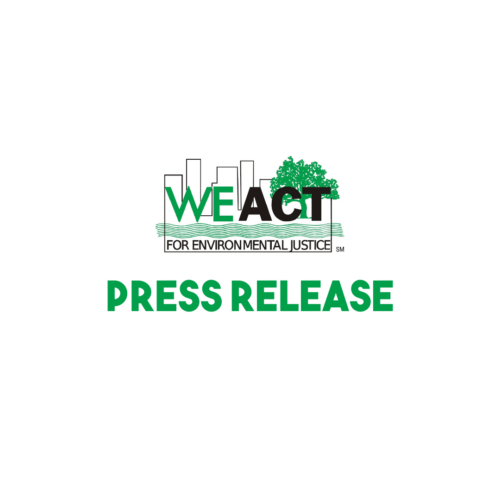FOR IMMEDIATE RELEASE
August 27, 2024
CONTACT:
Ali Hameed, ali.hameed@sunstonestrategies.org, 201.285.9649
Ashley Sullivan, ashley.sullivan@weact.org, 917-837-1183
Margie Kelly, mkelly@nrdc.org, 541-222-9699
As Heat-Related Health Risks Spike, a Federal Program Providing Lifesaving Cooling Relief for Vulnerable Residents Needs a Lifeline
The Low Income Home Energy Assistance Program (LIHEAP) lacks funds to cover the costs of lifesaving energy support for vulnerable groups, reaching only 17% of eligible households.
NEW YORK – Millions of American households enduring life-threatening heat are struggling to pay their energy bills while not being able to access critical federal funding for cooling relief. According to a new policy brief released by WE ACT for Environmental Justice and the Natural Resources Defense Council (NRDC), these communities need support to cover the costs of lifesaving cooling and other basic living expenses, which must be remedied by providing adequate funding and adjustments to the Low Income Home Energy Assistance Program (LIHEAP).
The brief, LIHEAP Needs a Lifeline: A Call to Strengthen the Low Income Home Energy Assistance Program in a Changing Climate, shows that the LIHEAP program, which helps vulnerable, energy-burdened families access lifesaving cooling benefits, does not have the necessary funds to respond to more frequent and severe heat waves.
LIHEAP was initially created to provide assistance to keep homes warm in the winter, but has expanded in scope to help Americans contend with the dangers of extreme heat. Yet, alarming examples and analysis suggest that funds are not available for those most in need—in New York, for example, LIHEAP funding ran out just three weeks into the summer of 2022. Only 0.3% of income-eligible households received benefits in the Pacific Northwest in 2021, even though an unprecedented heat wave killed at least 200 people in Oregon and Washington and sent many more to the emergency room.
Extreme heat-related deaths reached a 45-year high in 2023, with most deaths occurring indoors in homes without adequate cooling. About 10% of households in America lack cooling, a figure that increases when looking at people of color and lower-income households and renters. As the policy brief finds, expanding access to LIHEAP’s cooling benefits will be essential to protect these vulnerable groups, especially since hotter temperatures result in higher energy costs that disproportionately impact Black and Brown communities.
“More and more families are facing the real-life consequences of climate chaos—extreme heat is killing people and making them sick in their own homes,” said Caleb Smith of WE ACT for Environmental Justice. “Our communities, many of whom don’t own housing and are overburdened by the rising cost of living, should not have to risk their lives to avoid exorbitant energy bills. LIHEAP funding levels are not able to meet the needs of this urgent moment, especially as extreme heat continues to grow year after year. To save lives and build climate resilience in vulnerable communities, LIHEAP must be comprehensively reformed, beginning with a significant investment from Congress to adequately fund the program as life-threatening heat becomes our new reality.”
The U.S. Department of Human Health administers LIHEAP, and the funding is designated to help households stay safe and comfortable in the summer by providing assistance with home cooling bills, preventing energy shutoffs, reconnecting services, making homes more energy efficient, and repairing or replacing cooling equipment. Unlike other federal programs like the Supplemental Nutrition Assistance Program (SNAP), eligible households are not guaranteed LIHEAP assistance when they apply. Over the past decade, only about 17% of eligible households nationwide received any type of LIHEAP benefit each year, largely due to limited funding.
The report calls on Congress to refill LIHEAP’s long-empty emergency contingency fund and put the program on a path to annual appropriations of $40 billion annually. LIHEAP must also allow eligible households to receive heating and cooling benefits in a single calendar year, improve eligibility, remove barriers, and increase public participation.
“The climate crisis is causing more frequent and intense heat waves across the nation, endangering the health and welfare of far too many U.S. residents,” said Juanita Constible, senior advocate for environmental health at NRDC. “Congress needs to act to ensure those most in need can afford to cool their homes. Failing to do so puts the health and safety of vulnerable communities at risk.”
# # #
About WE ACT for Environmental Justice
WE ACT for Environmental Justice is a 501(c)(3) environmental justice organization and our mission is to build healthy communities by ensuring that people of color and/or low-income residents participate meaningfully in the creation of sound and fair environmental health and protection policies and practices. WE ACT for Environmental Justice is a membership organization with more than 1,100 members and offices in Harlem, N.Y. and Washington, D.C.
About NRDC
NRDC (Natural Resources Defense Council) is an international nonprofit environmental organization with more than 3 million members and online activists. Established in 1970, NRDC uses science, policy, law and people power to confront the climate crisis, protect public health and safeguard nature. NRDC has offices in New York City, Washington, D.C., Los Angeles, San Francisco, Chicago, Beijing and Delhi (an office of NRDC India Pvt. Ltd).
